Introduction
What if managing your firm’s finances could be as inspiring and effortless as designing your next masterpiece? Imagine having all the tools you need at your fingertips, allowing you to focus on what you do best—creating!
Imagine transforming your architecture firm’s financial chaos into seamless, stress-free efficiency with just the right software—no more juggling endless spreadsheets or losing track of billable hours.
Picture everything—your invoicing, expense tracking, and project budgets—handled in one sleek, powerful tool. It’s like having your own financial command center that saves you time and boosts your bottom line.
Whether you’re a solo architect or leading a large firm, the right accounting software can revolutionize the way you work. Ready to unlock a whole new level of control over your firm’s finances? Explore the absolute best accounting software for architects and see how it can transform your business!
>>> MORE: Best Billing Software for Airbnb
1. QuickBooks Online
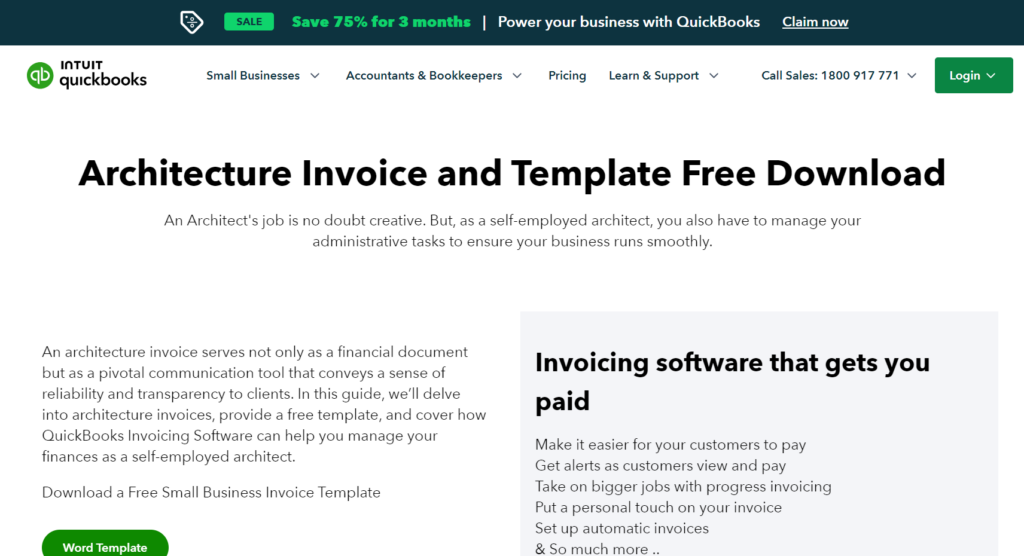
Imagine having an accounting solution that’s as flexible as your architectural designs. QuickBooks Online is that solution. If you’re managing a small to mid-sized architecture firm, it’s perfect for you. It’s easy to use, grows with your business, and integrates seamlessly with other tools you use.
Pros:
- Offers a user-friendly interface
- Provides robust reporting and budgeting tools
- Integrates extensively with third-party applications
Cons:
- Becomes expensive as you scale
- Limits customization for architecture-specific needs
Features:
- Track income and expenses
- Create and send invoices
- Manage expenses
- Monitor inventory levels
- Calculate project profitability
- Track and pay bills
- Receive tax assistance
- Track time
- Accept payments and calculate sales tax
- Track mileage
Pricing:
- Simple Start: US$19/month
- Essentials: US$28/month
- Plus: US$40/month
- Advanced: US$76/month
Integrations: QuickBooks Online integrates with Amazon Business, PayPal, Square, Etsy, Shopify, eBay, SOS Inventory, QuickBooks Time, and Method:CRM.
2. FreshBooks
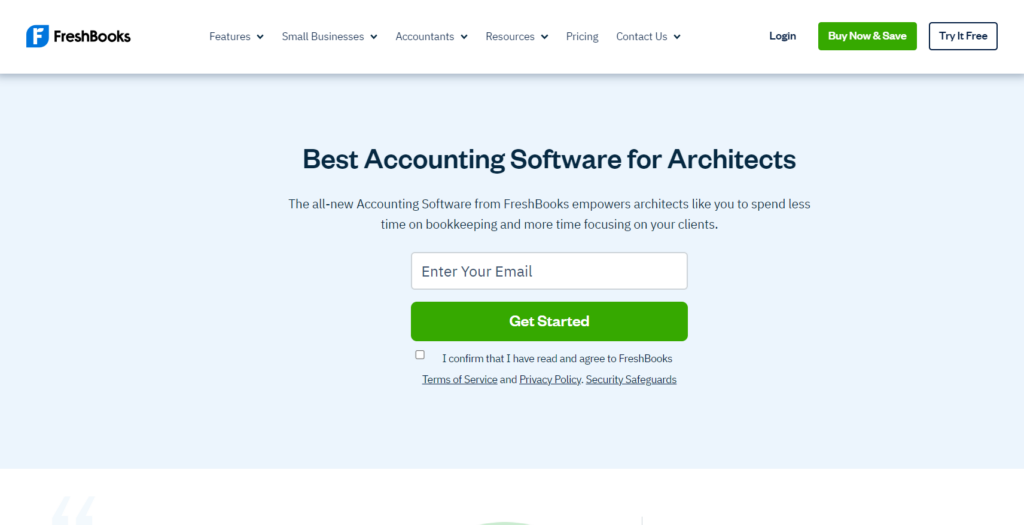
Are you a freelance architect or running a small firm? FreshBooks makes your financial life easy. It’s effortless to send invoices, track your time, and manage your expenses. It’s like having a personal financial assistant just for you.
Pros:
- Delivers excellent invoicing capabilities
- Offers easy-to-use time tracking for projects
- Remains affordable for small firms
Cons:
- Provides limited features for large firms
- Offers fewer integrations than some competitors
Feature:
- Creates and sends invoices
- Tracks and categorizes expenses
- Logs billable hours
- Manages projects
- Creates and sends estimates
- Generates detailed reports
- Accepts payments
- Handles multi-currency transactions
- Provides a client portal
Pricing:
- Lite: $5.70/month (discounted from $19) for up to 3 months. Includes basic features for up to 5 clients.
- Plus: $9.90/month (discounted from $33) for up to 3 months. Includes features for up to 50 clients, recurring invoices, and automatic receipt data capture.
- Premium: $18.00/month (discounted from $60) for up to 3 months. Includes all features in Plus, plus additional advanced features.
Note: All plans include team members, advanced payments, and FreshBooks Payroll as add-ons.
Integrations: FreshBooks integrates with Stripe, PayPal, G Suite, Slack, Zapier, Shopify, Mailchimp, HubSpot, Trello, and QuickBooks.
3. Sage Intacct
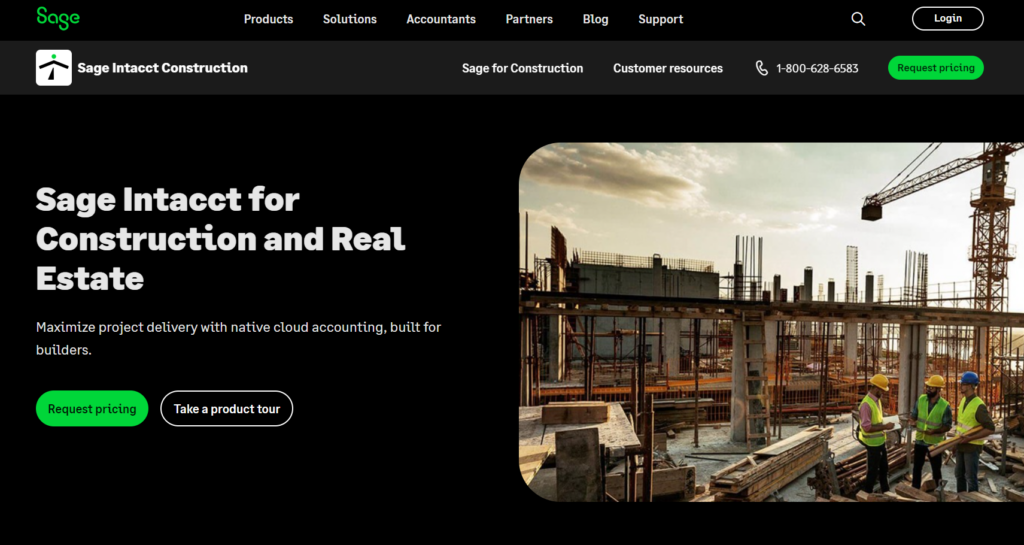
With Sage Intacct, you get powerful cloud-based financial management tools for growing your architecture firm. If you need scalability and precision, its features for accounts payable, project accounting, and budgeting are ideal for your business.
Pros:
- Delivers advanced financial reporting
- Offers seamless scalability for growing firms
- Integrates effectively with other business applications
Cons:
- Presents a steeper learning curve for beginners
- Commands a higher cost compared to basic accounting tools
Feature:
- Automates core financial processes
- Offers advanced functionality
- Provides dashboards and reporting
- Manages project accounting
- Tracks time and expenses
- Automates revenue recognition
- Manages inventory
- Facilitates budgeting and planning
- Leverages AI and automation
Pricing: Sage Intacct does not publicly display its pricing on its official website. However, Sage Intacct customizes its pricing plans to meet your specific business needs.
For a personalized quote, you need to reach out to Sage’s team. They respond within 24 hours with options designed to fit your requirements.
Integrations: Sage Intacct integrates with popular platforms like Salesforce, ADP, Expensify, Bill.com, Stripe, Shopify, PayPal, American Express, DocuSign, and Zapier.
>>> PRO TIPS: Best Billing Software for Lawn Care
4. Xero
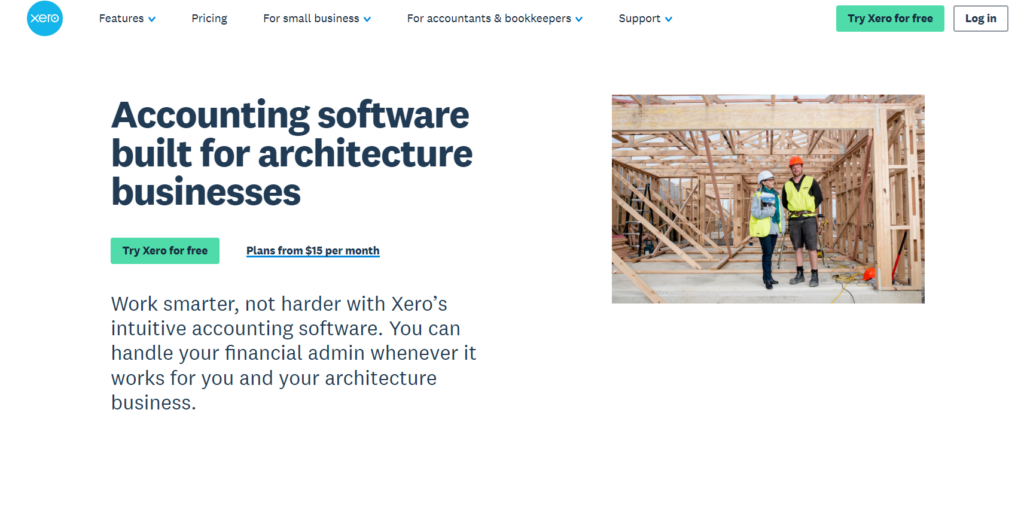
Looking for an affordable accounting system that doesn’t sacrifice features? Xero is a great choice. It’s cloud-based, so you can access it from anywhere, and it plays nicely with your favorite project management tools. If your architecture firm has simple to moderate needs, Xero is a perfect fit.
Pros:
- Offers affordable pricing
- Provides strong integration options
- Operates cloud-based with real-time data
Cons:
- Limits in-app project management features
- Requires third-party integrations for architecture-specific needs
Feature:
- Reconcile bank transactions
- Create and send invoices
- Manage expenses
- Track inventory
- Track projects
- Process payroll
- Handle multi-currency accounting
- Generate reports
- Calculate sales tax
- Store files online
Pricing:
- Starter: Discounted from $29 to $7.25/month for up to 3 months.
- Standard: Discounted from $46 to $11.50/month for up to 3 months.
- Premium: Discounted from $62 to $15.50/month for up to 3 months.
Note: These are promotional prices available until September 30th. Regular pricing will apply after the promotion ends.
Integrations: Xero integrates with Shopify, Stripe, PayPal, Square, Hubdoc, Gusto, Mailchimp, Expensify, Zapier, and CRM systems.
5. Zoho Books
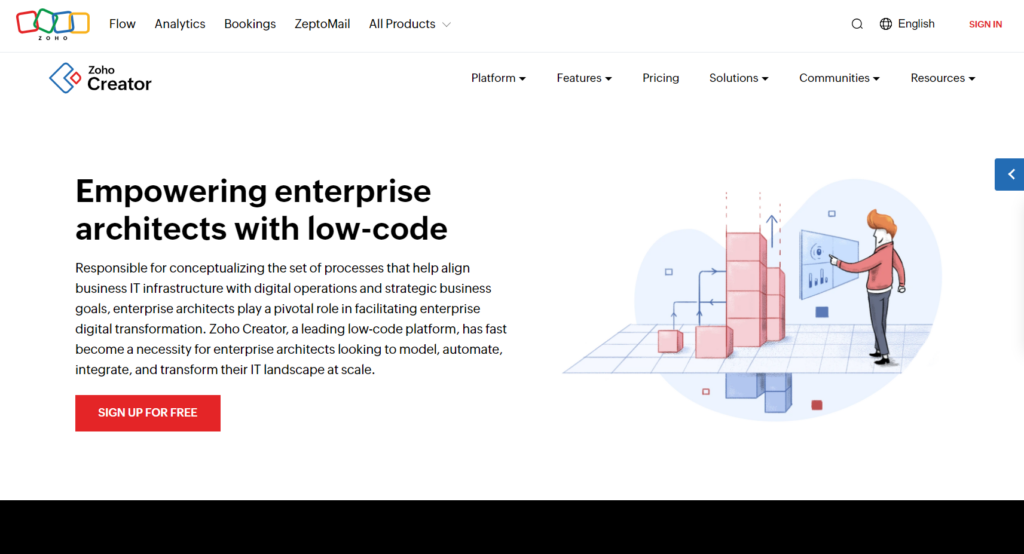
Looking for a powerful accounting solution that won’t break the bank? Zoho Books is your answer. It’s packed with features and the best part? it’s still affordable! Whether you’re a small or large architecture firm, Zoho Books can handle your financial needs with ease. It’s the perfect blend of power and affordability.
Pros:
- Offers affordable pricing tiers
- Provides comprehensive automation features
- Ensures strong integration with Zoho apps
Cons:
- Limits scalability for larger firms
- Provides fewer advanced features compared to competitors
Feature:
- Offers invoicing
- Tracks expenses
- Reconciles bank transactions
- Manages inventory
- Tracks projects
- Handles multi-currency transactions
- Creates and manages sales and purchase orders
- Provides a client portal
- Automates tax management
- Generates customizable reports
Pricing:
Basic plans to get you started
- Free: $0
- Standard: $15/month (billed annually)
- Professional: $40/month (billed annually)
- Premium: $60/month (billed annually)
Plans that go beyond the basic
- Professional: $40/month (billed annually)
- Premium: $60/month (billed annually)
- Elite: $120/month (billed annually)
- Ultimate: $240/month (billed annually)
Integrations: Zoho Books integrates with Zoho CRM, Zoho Projects, Zoho Inventory, Stripe, PayPal, Square, G Suite, Office 365, Zapier, and Slack.
6. Wave
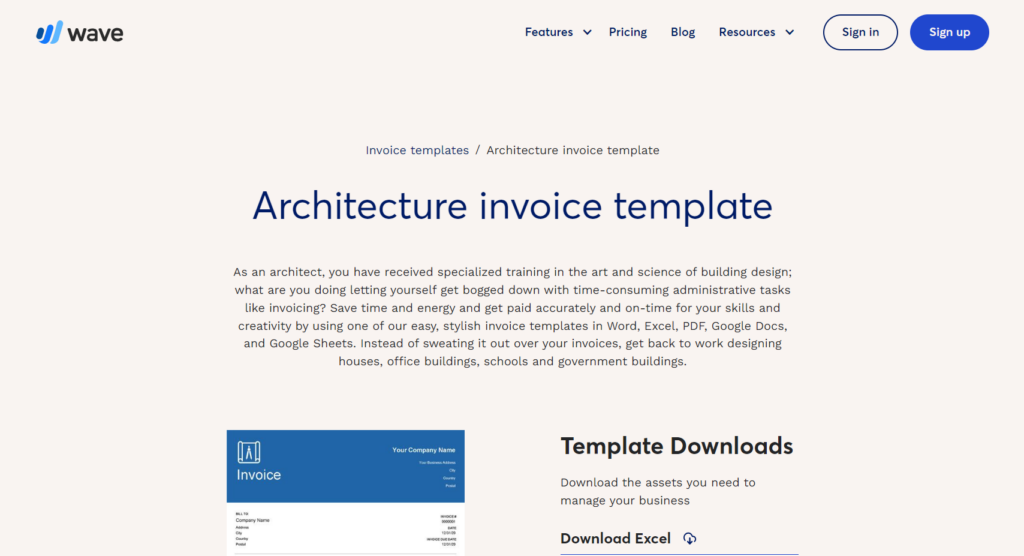
Wave is perfect for you if you’re a freelancer or managing a small architecture firm. It’s free, easy to use, and offers essential tools like invoicing and expense tracking, making it an ideal entry-level option.
Pros:
- Provides completely free accounting tools
- Offers simple invoicing and receipt scanning
- Delivers a user-friendly interface
Cons:
- Lacks advanced features for larger firms
- Provides limited customer support options
Feature:
- Creates and sends invoices
- Tracks and categorizes expenses
- Reconciles bank transactions
- Manages accounting
- Scans receipts
- Manages multiple businesses
- Calculates and tracks sales tax
- Provides cash flow insights
Pricing:
- Starter: Free plan with unlimited invoices, estimates, bills, and bookkeeping records.
- Pro: Recommended plan for $16/month (billed monthly), offering additional features like online payments and cash flow management.
Integrations: Wave integrates with Wave Payments, Wave Payroll, Zapier, and Google Sheets.
Overview of Best Accounting Software For Architects

When it comes to managing finances as an architect, you need software that caters to both accounting and project management. The best accounting software streamlines your invoicing, expense tracking, and financial reporting while also helping you keep tabs on projects.
Whether you run a small practice or manage a larger firm, finding software that aligns with your workflow is key. You want tools that can handle the unique aspects of architecture, from tracking billable hours to managing complex budgets for different clients and projects.
>>> GET STARTED: NetSuite Accounting Software: Get it or Not?
How to Choose Best Accounting Software For Architects
Start by considering your firm’s size and needs. Are you looking for a tool that handles simple invoicing and expense tracking, or do you need robust project management features integrated into your accounting software?
Look at scalability too—does the software grow with you as your business expands? Make sure you check for industry-specific features like time tracking, project-based reporting, and seamless integrations with design and project management tools you already use.
You also want to evaluate the user interface, pricing, and customer support options to ensure you get the best value.
Pros & Cons of Best Accounting Software For Architects
Pros
- Lacks customization in some generic software
- Increases costs with advanced features
- Becomes expensive for multiple users
Cons
- Initial learning curve
- High pricing for small businesses
- Limited customer support options
- Full functionality requires internet connection
- Occasional software bugs
What to Watch Out For

- Hidden Costs: Check for hidden fees that may increase as your firm grows or as you add features.
- Unnecessary Features: Avoid software with features you don’t need, which can complicate usage and increase costs.
- Tool Compatibility: Ensure the software integrates seamlessly with your existing project management or design tools.
- Learning Curve: Evaluate how easy the software is to learn and whether it fits into your current workflow.
Pro Tips
- Test free trials or demos before purchasing
- List must-have features to avoid unnecessary extras
- Prioritize reliable customer support for troubleshooting
- Consider future scalability as your firm grows
Recap
Choosing the best accounting software for your architecture firm is essential for streamlining your financial operations and staying on top of project budgets. Whether you need basic invoicing or advanced project management, there’s a solution to your needs.
QuickBooks Online, FreshBooks, Sage Intacct, Xero, Zoho Books, and Wave all offer unique features to enhance your financial workflow. As you decide, focus on your firm’s size, scalability, and industry-specific requirements.
By making the right choice, you can gain control, save time, and ultimately boost your firm’s financial health.













